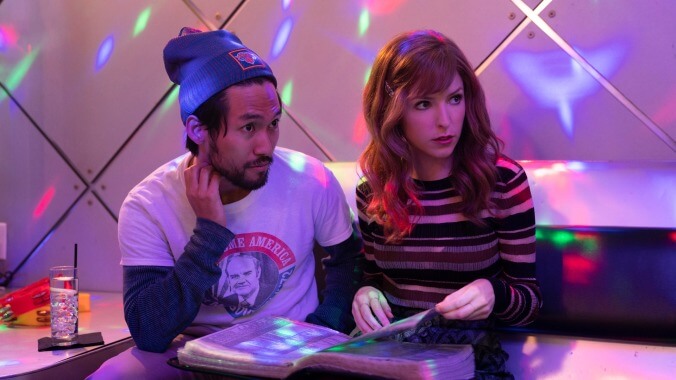Anna Kendrick can’t break free of the formulaic Love Life’s patterns


The offerings that make up HBO Max’s launch slate are being judged as much on their own merits as for what they say about the new streamer, which, despite the corporate pedigree, still has an amorphous identity; even its accessibility remains a matter of confusion for cable subscribers and cord cutters alike. As the first, non-Elmo-centered scripted series for the service, Sam Boyd’s Love Life probably seemed a safe bet. With its plucky lead and series of New York City-based romantic entanglements, this seasonal anthology looks poised to follow in the stilettoed footsteps of Sex And The City. It wouldn’t be the calling card Netflix left in its first foray into original content, or the exciting new chapter in an interstellar story that Disney+ rolled out with its launch, but a smart, sexy comedy would not only be welcome right now, it would fit right in with HBO’s history of trenchant series.
Love Life fails to live up to either of those expectations, offering rote observations about interpersonal relationships and shallow characterization. At the start of the series, a chipper British narrator relates statistics on relationships and marriage that will either make people feel bad about their prospects for a second marriage (despite the fact that the same “anecdata” indicates second marriages are often more successful than first marriages), or emphasize the rarity of “true love.” Love Life then purports to show us the people behind the numbers, but Boyd and his fellow executive producers Bridget Bedard and Paul Feig struggle to make any of the characters consistently three-dimensional.
Anna Kendrick leads the first season as Darby Carter, an aimless postgrad whose fear of abandonment is spelled out in the grating voiceover. Darby’s parents (played by Hope Davis and James LeGros) split during her formative years, and being shuttled between households had an adverse effect on her sense of stability. Love Life follows Darby for almost a decade, beginning in 2012, the year that apparently every adorable woman had bangs. Each episode moves the timeline forward by a few months to a year, as Darby either falls in love, hooks up, or makes do with different dude archetypes: the sophisticated older man, the good-on-paper guy, and the idealistic guy, Augie Jeong (Devs’ Jin Ha), who breaks her heart before the end of the premiere.
Darby’s quest for a stable relationship—the kind she assumes everyone else has, despite all evidence to the contrary—eclipses everything else in her life, including her friendships with roommates Sara (Zoë Chao) and Mallory (a vastly underutilized Sasha Compère). Her single-mindedness might actually resonate if neglecting the other aspects of life had any real consequences, but Love Life gives Darby an increasingly frictionless existence. She manifests an impressive, high-paying job that gives us very little sense of who she is outside of a relationship or what she values in life, but it does explain how she can continue to live in one of the most expensive cities in the country.
This kind of fantasy might work (and has worked, on shows like Sex And The City) if, in focusing on Darby’s love life, the series gleaned anything new about sex, romance, and how our emotional baggage can prevent us from engaging in either. But Love Life gets trapped in the patterns it outlines, placing Darby in familiar rom-com situations—running into your boyfriend’s ex, trying to empower yourself through a one-night stand—and letting her plod through them. Kendrick is reliably charming in the role, occasionally finding vulnerability in a role that appears stitched together from her big-screen appearances in Up In The Air, Mr. Right, and Get A Job (there’s even a shocking shake-up to her sweet façade à la A Simple Favor). Chao, Compère, and Ha lend some verve and verisimilitude to the New York City of Love Life, but they serve Darby’s purposes rather than any of their own. Sara is the most fleshed out of the secondary characters, which isn’t saying much, and Chao pops whenever she’s on screen. But her trauma is reduced to a trait, and worse, an obstacle that Darby must clear.
There’s potential in a story about a selfish, love-obsessed person, whether or not she evolves into a more well-rounded character, but Love Life clearly doesn’t view its first protagonist (each season will focus on a different lead character) that way. It actually tries to establish that Darby is a caring yet flawed individual with a flashback to the time she defecated in the yard of her young crush because—aww—she was nervous about lying about living on the same cul-de-sac, and present-day scenes of her judging a friend with substance abuse problems for not being as suddenly and unaccountably “together” as she is.
Ultimately, despite its myopia, Love Life proves it’s not even that invested in its lead character. By the end of the eight episodes screened for critics (out of the full season’s 10), the only indicators of Darby’s growth are material ones: better clothes, accessories, and apartments. In the second episode, Darby projects fantasies about an Impossible Woman onto a fellow subway passenger: a beautiful, fashionable woman with nothing in her designer bag except a little makeup, a way of making herself presentable. Six episodes later, she’s become that woman, to her own detriment and the show’s.